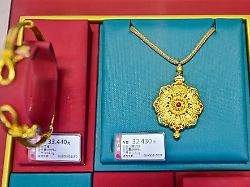Because China’s economy is crumbling, rich Chinese people are smuggling their money out of the country. This is hardly possible legally – that’s why they use a network that has been tried and tested for many years. Anyone caught engaging in illegal activities will face severe penalties.
Quiet Luxury is the new trend in China. Rich Chinese hide their wealth. Unobtrusive, no bright colors, but well maintained, these are the characteristics of the Laoqianfeng style. Half of Chinese luxury buyers rely on minimalist logos and timeless pieces, according to one Barclays study out.
Prosperity is frowned upon in China anyway. Luxury billboards have been in Beijing since 2011 forbidden. The Douyin social network deletes Videos and accounts flaunting wealth.
President Xi Jinping is fighting inequality in the country and wants to regulate wealth. He proclaimed “common prosperity” for all. The super-rich are alarmed and want to keep their money safe abroad.
Rich Chinese spread their wealth
More and more people are emigrating: in 2022, 10,800 millionaires left the country, and in 2023 there was the world’s largest exodus in China with a predicted 13,500 rich emigrants, according to one study from Henley & Partners. The destinations of rich emigrants are primarily Australia, the United Arab Emirates, Singapore and the USA.
The weakening economy with high youth unemployment of over 20 percent and a struggling real estate sector as well as tensions with Taiwan and the USA do not make China a good place at the moment. Wealthy Chinese want to know their money is safe. Not just to build up an emergency fund for future immigration to another country. But also simply to spread your assets.
However, it is hardly possible to legally send money abroad from China. Chinese people are only allowed to transfer a limited amount out of the country per year: $50,000. Anyone who emigrates is only allowed to transfer money once.
Underground banks use hawala system
Many rich people therefore secretly use an informal system to transfer their money to their new home before emigrating: Hawala means reports Bloomberg. Hawala banking has its roots in the Orient. In Arabic, hawala means “bill of exchange”, “check” or “money order”. Unlike a bank, it is not regulated or controlled. It’s more of a network based on trust.
The transactions are processed through agents called hawaladars. The money will be transferred to them. The agents then send the money to other agents abroad – not directly, but rather by telephone, for example. For this purpose, a code is agreed upon, for example “a combination of numbers or words,” explains Sebastian Fiedler, SPD member of the Bundestag and former chairman of the Association of German Criminal Investigators, on RTL. The total is offset using internal accounting systems. The contact persons then either pay out the money in cash or transfer it to an account abroad.
This allows money to be transferred anonymously and in real time. There is no accounting – that makes proof difficult.
The system is also used in Germany – although it is banned. In 2019 there was a major raid in several federal states. A man is said to have set up a hawala banking system between Germany and Turkey. Around 200 million euros are said to have been trafficked.
150 billion dollars flow abroad
In China, established financial experts often put you in touch with the transfer agencies. Demand for hawala banking has increased among wealthy families, according to Bloomberg. Especially since international borders have been open again after the pandemic.
Last year, up to $150 billion flowed abroad from China, an economist at the French investment bank Natixis estimates, according to the report. Prosperity in China has increased in recent decades. Live there after the USA most millionaires in the world with a fortune of two trillion US dollars. However, they make a significantly lower one Portion of the population.
The hawala networks operate globally. Anywhere where there are a lot of Chinese people. Underground banks have pools of money in key locations so recipients can get cash quickly and in local currency, according to a 2019 report by Britain’s National Crime Agency.
Hawala money comes from criminals
It is not known exactly how big the hawala industry is in China – but various reports indicate that it is enormous. In 2021, a business worth over 75 billion yuan was uncovered in China’s Gansu province, state media reported. The money was spread across a network of five organizations using over 8,000 bank accounts in more than 20 provinces.
According to the British Criminal Investigation Department, the money for the hawala transfer transactions in China comes from dark sources: from criminal groups – from drug and human trafficking or cigarette smuggling.
Anyone who uses the system, which is illegal in China, must expect penalties: at least a third of the transfer amount will be due if you are caught. According to Bloomberg, larger amounts can result in prison sentences of one to five years.
Nevertheless, demand for underground banks is likely to remain high if China further tightens cash transfer laws.
“Learned something again” is a podcast for those who are curious: Why would a ceasefire probably just be a break for Vladimir Putin? Why does NATO fear the Suwalki Gap? Why does Russia have iPhones again? What small behavioral changes can save 15 percent energy? Listen in and get a little smarter three times a week.
You can find all episodes in the ntv app RTL+, Amazon Music, Apple Podcasts and Spotify. For all other podcast apps you can use the RSS feed.
You have a question? Please send us an email to [email protected]
